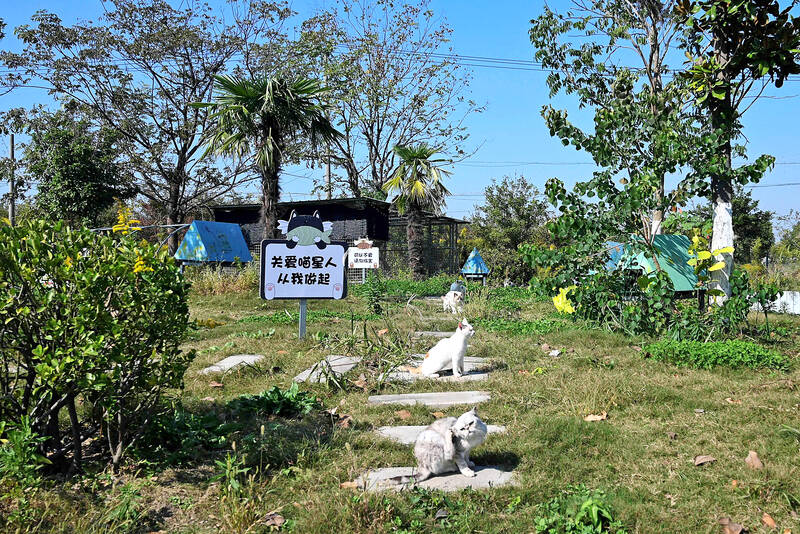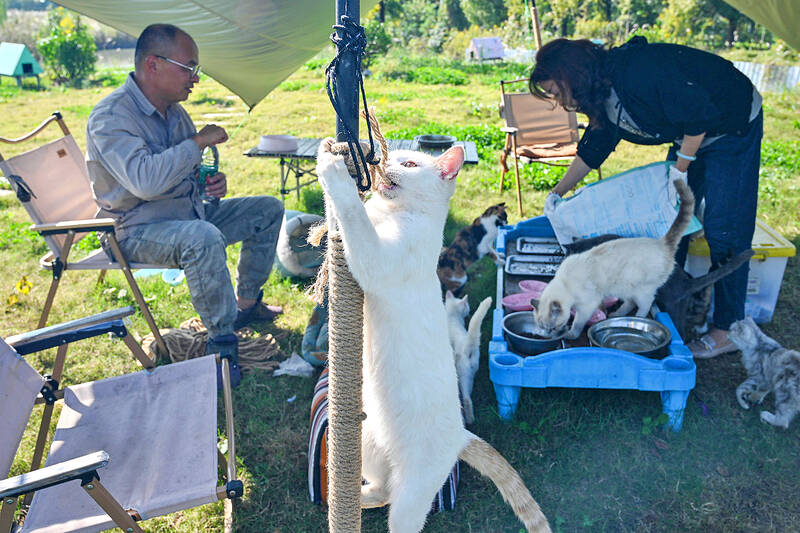When Han Jiali’s beloved cat Dabai was taken from her Shanghai home last year, she embarked on a hunt for her pet that took her deep into the bowels of China’s underground feline meat trade.
Most people in China do not eat cat meat, but an estimated four million furry friends are slaughtered for food each year in an illegal market that includes areas of Guangdong province, neighboring Guangxi and beyond, according to Humane Society International.
Han, who has spent thousands of dollars and weeks at a time tracking cat meat traders through China, has uncovered a supply chain preying on urban strays and outdoor pets in the region surrounding Shanghai.

Photo: AFP
Her quest to find Dabai led her to grimy processing plants in Guangdong, where she saw skinned cat carcasses piled in crates and sacks of fur.
She found village restaurants that openly advertised cat meat and unscrupulous sellers who passed it off as mutton or rabbit.
“I had to admit then that my cat was gone,” an emotional Han said. “She had been eaten.”

Photo: AFP
Now she is determined to save other cats from the same fate and has spent the past year filing police reports, tracking down thieves and sending petitions to the Guangdong government.
It’s a dangerous mission that she says has resulted in death threats from cat meat traders and an incident in December when a man deliberately drove into her car at a highway rest stop.
“I’ve gotten scared and thought about turning away and pretending I never saw all this,” she said. “But if I disappear, and stay silent, who will save (the cats) from this miserable situation?”
UNDERGROUND INDUSTRY
The 33-year-old Han is one of a small but dedicated number of people in China fighting the abuse of pet cats and dogs in the absence of broader institutional protections for domestic animals.
The capture of a free-roaming family pet outdoors is not considered theft in China.
And while the law prohibits the consumption of cats, violators are fined on food safety grounds rather than punished for animal cruelty.
Activists and even state media commentators have increasingly called for legislators to adopt an animal cruelty law to close a loophole not covered by existing wild animal and livestock rules.
“I’m just an ordinary person, my abilities are limited,” Han said.
Last month, she and other animal rescuers, with the help of local police, intercepted a truck carrying hundreds of cats out of Zhangjiagang, near Shanghai.
“They were collecting (trapped) cats inside a cemetery,” she said. “Observing them, we quickly learned that they planned to illegally sell the captured kitties.”
Han said she and the other activists spent a sleepless night staking out the cemetery before a truck appeared in the morning to take away dozens of tiny bamboo crates crammed with around 800 cats.
Police and the animal rescuers stopped the truck, and the cats were rushed to a shelter in the town of Taicang, an hour away from Shanghai.
CAT ISLAND
There the animals were taken in by Mengtaiqi Cat and Dog Manor, a small family-run shelter in a marshy area popular with anglers.
Gu Ming, a 45-year-old former pharmaceutical industry professional who lives at the shelter with his wife, said that many of the cats rescued in Zhangjiagang had their limbs crushed under the weight of hundreds of animals.
Dozens have died so far from injuries and viral infections that spread rapidly among the closely packed, distressed animals, he said.
Volunteers at the shelter isolated sick animals in makeshift quarantine cages and called in vets to vaccinate and sterilize the healthier cats.
Eventually, after weeks of treatment and isolation, a first batch of rescues was moved to a large outdoor enclosure with trees and rows of blanket-lined beds.
Gu covers the shelter’s expenses out of his own pocket and only accepts non-cash donations such as equipment and kibble, seeking to avoid the public distrust that fundraisers often attract in China.
He plans to move all the cats onto a small island near a local temple, which is currently dotted with tiny huts and home to a few dozen felines previously rescued by the shelter.
The island’s four-legged residents flocked to greet Gu this month as he crossed the gated bridge that keeps the cats in.
At midday, the animals lolled on the grass and napped under trees — an idyllic existence a far cry from the cramped meat truck crates.
Gu said he was moved by the many animal lovers who had offered help after seeing state media reports about the Zhangjiagang cats.
But still, he said: “We have to push for national legislation, because depending on individuals or a few groups is not realistic.”

Growing up in a rural, religious community in western Canada, Kyle McCarthy loved hockey, but once he came out at 19, he quit, convinced being openly gay and an active player was untenable. So the 32-year-old says he is “very surprised” by the runaway success of Heated Rivalry, a Canadian-made series about the romance between two closeted gay players in a sport that has historically made gay men feel unwelcome. Ben Baby, the 43-year-old commissioner of the Toronto Gay Hockey Association (TGHA), calls the success of the show — which has catapulted its young lead actors to stardom -- “shocking,” and says

Inside an ordinary-looking townhouse on a narrow road in central Kaohsiung, Tsai A-li (蔡阿李) raised her three children alone for 15 years. As far as the children knew, their father was away working in the US. They were kept in the dark for as long as possible by their mother, for the truth was perhaps too sad and unjust for their young minds to bear. The family home of White Terror victim Ko Chi-hua (柯旗化) is now open to the public. Admission is free and it is just a short walk from the Kaohsiung train station. Walk two blocks south along Jhongshan

The 2018 nine-in-one local elections were a wild ride that no one saw coming. Entering that year, the Chinese Nationalist Party (KMT) was demoralized and in disarray — and fearing an existential crisis. By the end of the year, the party was riding high and swept most of the country in a landslide, including toppling the Democratic Progressive Party (DPP) in their Kaohsiung stronghold. Could something like that happen again on the DPP side in this year’s nine-in-one elections? The short answer is not exactly; the conditions were very specific. However, it does illustrate how swiftly every assumption early in an

Snoop Dogg arrived at Intuit Dome hours before tipoff, long before most fans filled the arena and even before some players. Dressed in a gray suit and black turtleneck, a diamond-encrusted Peacock pendant resting on his chest and purple Chuck Taylor sneakers with gold laces nodding to his lifelong Los Angeles Lakers allegiance, Snoop didn’t rush. He didn’t posture. He waited for his moment to shine as an NBA analyst alongside Reggie Miller and Terry Gannon for Peacock’s recent Golden State Warriors at Los Angeles Clippers broadcast during the second half. With an AP reporter trailing him through the arena for an